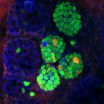(Press-News.org) Philadelphia, PA, March 11, 2014 – The course of Parkinson disease (PD) can vary from gradual deterioration to precipitous decline in motor or cognitive function. Therefore identifying predictors of progression can benefit understanding of PD disease progression and impact management. Data from 304 PD patients followed for up to 8 years indicate that patients with higher cerebrospinal fluid (CSF) alpha-synuclein levels experienced faster cognitive decline in the following months, although no associations were found between alpha-synuclein levels and motor changes. The results are published in The American Journal of Pathology.
A characteristic pathological feature of PD is the presence of Lewy bodies, which are formed by intracellular deposits of the protein alpha-synuclein in neurons. Although several large studies have shown that alpha-synuclein levels are lower in the CSF of PD patients and those with related synucleinopathies compared to controls, its role in cognitive decline and dementia had been unexplored.
Researchers were able to access CSF samples from the deprenyl and tocopherol antioxidative therapy of Parkinsonism (DATATOP) study, which is the largest cohort assembled to date with longitudinal collection of biological fluids and clinical data from PD patients. "DATATOP subjects were recruited at early disease stages, without apparent signs of dementia and prior to needing dopamine-supplementing drugs, making this cohort ideal for studying PD progression," explains Jing Zhang, MD, PhD, Department of Pathology at the University of Washington School of Medicine (Seattle).
Cognitive performance and other clinical measures, including the United Parkinson Disease Rating Scale (UPDRS), Mini-Mental State Exam (MMSE), and Hoehn and Yahr scales, were assessed at the beginning of the study and subsequently every 6 months, with an average follow-up time of 1.8 years and maximum of 8 years. Data were separated into Phase I (the time between study entry and a clinician's determination that levodopa therapy was required) and Phase II (the time between initiation of levodopa therapy and the conclusion of follow-up). CSF samples were collected at the beginning of Phases I and II. Although the study began as a randomized trial that divided subjects into four treatment groups (placebo, deprenyl, alpha-tocopherol, and deprenyl/alpha-tocopherol), this was terminated early because positive effects of deprenyl were observed and all subjects then received deprenyl for approximately 18 months.
The investigators found that although alpha-synuclein levels decreased significantly over the course of the study, in agreement with previous studies lacking the longitudinal component, its values did not predict the worsening of motor symptoms (as measured by UPDRS) over Phase I or Phase II. "One possible explanation is that UPDRS reflects primarily deficits arising from nigrostriatal degeneration, whereas CSF alpha-synuclein levels are influenced by the whole brain and may serve as a proxy for total brain pathology," says Dr. Zhang.
The findings for cognition were quite different: Higher CSF alpha-synuclein levels predicted faster cognitive decline. The results were significant during Phase II. Analyses were controlled for age, sex, education, exposure to study drug, and prescribed dose of levodopa. The tests evaluated multiple modes of cognition, including verbal learning and memory and visuospatial working memory/processing speed. Similar trends were found for all tests.
"The finding that alpha-synuclein levels decrease as PD progresses, yet those with higher alpha-synuclein levels experience faster cognitive decline, is somewhat counterintuitive," comments Dr. Zhang. He and his colleagues, including first author, Tessandra Stewart, PhD, suggest that the decrease in CSF alpha-synuclein may be the result of a compensatory process, reflecting greater retention of the protein in the brain. This may allow damaged or degenerating neurons to maintain their function for longer than those who are less efficient at retaining alpha-synuclein.
Dr. Zhang points out that the unique value of this study derives from the ability to perform longitudinal assessments of cognition in PD patients over a long time period and access to data from a large cohort that began when patients were in the earliest stage of disease.
INFORMATION:
PD is the second most common neurodegenerative disorder in the United States, affecting approximately one million Americans and five million people worldwide. Its prevalence is projected to double by 2030. The most obvious symptoms are movement-related, such as involuntary shaking and muscle stiffness; non-motor symptoms, including cognitive impairments and dementia, anxiety, and sleep disturbances, are also seriously debilitating.
Higher levels of CSF alpha-synuclein predict faster cognitive loss in Parkinson disease
Counterintuitive findings offer new insights into Parkinson disease pathology, according to new research published in The American Journal of Pathology
2014-03-11
ELSE PRESS RELEASES FROM THIS DATE:
Cellular alchemy: Penn study shows how to make insulin-producing cells from gut cells
2014-03-11
PHILADELPHIA — Destruction of insulin-producing beta cells in the pancreas is at the heart of type 1 and type 2 diabetes. "We are looking for ways to make new beta cells for these patients to one day replace daily insulin injections," says Ben Stanger, MD, PhD, assistant professor of Medicine in the Division of Gastroenterology, Perelman School of Medicine at the University of Pennsylvania. Transplanting islet cells to restore normal blood sugar levels in patients with severe type 1 diabetes is one approach to treating the disease, and using stem cells to create beta cells ...
Gesturing with hands is a powerful tool for children's math learning
2014-03-11
Children who use their hands to gesture during a math lesson gain a deep understanding of the problems they are taught, according to new research from University of Chicago's Department of Psychology.
Previous research has found that gestures can help children learn. This study in particular was designed to answer whether abstract gesture can support generalization beyond a particular problem and whether abstract gesture is a more effective teaching tool than concrete action.
"We found that acting gave children a relatively shallow understanding of a novel math concept, ...
Education boosts brain function long after school
2014-03-11
European populations are growing older on average, a trend that could pose serious challenges to health care, budgets, and economic growth. As a greater proportion of a country's population grows into old age, average cognition levels and national productivity tend to decline, and the incidence of dementia increases.
"Finding ways to improve the cognition of seniors is of central importance to the economic well-being of aging countries," says IIASA researcher Vegard Skirbekk, who worked on the study with researchers Nicole Schneeweis and Rudolf Winter Ebmer at Linz University
The ...
Researchers closer to improving safety, effectiveness of lithium therapy
2014-03-11
Tampa, FL (March 11, 2014) – Lithium, one of the oldest and most widely used drugs to treat neuropsychiatric illnesses, such as bipolar disorder, has a serious drawback – toxicity. In a continued effort to find a safer form of lithium, researchers at the University of South Florida (USF) have discovered that lithium salicylate, an alternative salt form, might be the answer.
The researchers found that oral lithium salicylate produced steady lithium levels up to 48 hours in rats without the toxic spike associated with the rapid absorption of current FDA-approved lithium ...
What's the upside of feeling too sad for chocolate?
2014-03-11
The instant gratification and the pleasure derived from consuming excessive chocolate and deep-fried foods can lead way to a double-edged sword of negative consequences ranging from weight gain to feelings of low self-esteem. According to a new study in the Journal of Consumer Research, combating this type of self-destructive behavior may be achieved simply by making a person feel sad.
"We found that when people who are sad are exposed to pictures of indulgent food or indulgent words, their sadness highlights the negative consequences of indulging and encourages them ...
Restoring order in the brain
2014-03-11
Alzheimer's disease is the most widespread degenerative neurological disorder in the world. Over five million Americans live with it, and one in three senior citizens will die with the disease or a similar form of dementia. While memory loss is a common symptom of Alzheimer's, other behavioral manifestations — depression, loss of inhibition, delusions, agitation, anxiety, and aggression — can be even more challenging for victims and their families to live with.
Now Prof. Daniel Offen and Dr. Adi Shruster of Tel Aviv University's Sackler School of Medicine have discovered ...
Time versus money? Placing a value on buyer's remorse
2014-03-11
From a product's price to its convenience, ease of use, and number of overall features, many factors play into getting the most "bang for your buck." According to a new study in the Journal of Consumer Research, when it comes to weighing tradeoffs, selecting something more expensive based on perceived value might lead to buyer's remorse in the long run.
"We propose that when making an immediate decision between complexity and convenience, consumers believe that products with more features and functions represent higher value, even if the complex product might lead to ...
Power play: Empowered consumers are more likely to switch brands
2014-03-11
As consumers, we form favorite brands and select services providers from a plethora of choices. According to a new study in the Journal of Consumer Research, how powerful we feel in our daily lives may impact our likelihood of switching favorites, trying something new, or both.
"Our research examines the impact of a person's perceived sense of power on their likelihood to switch products or brands," write authors Yuwei Jiang, Lingjing Zhan (both Hong Kong Polytechnic University), and Derek D. Rucker (Kellogg School of Management, Northwestern University).
Over six ...
Gene therapy for lysosomal storage disease shown to be safe and well tolerated
2014-03-11
New Rochelle, NY, March 11, 2014—Several young children suffering from a severe degenerative genetic disease received injections of therapeutic genes packaged within a noninfectious viral delivery vector. Safety, tolerability, and efficacy results from this early stage clinical trial are reported in Human Gene Therapy, a peer-reviewed journal from Mary Ann Liebert, Inc., publishers. The article is available on the Human Gene Therapy website.
Marc Tardieu, Université Paris-Sud and INSERM, and a team of international researchers administered the adeno-associated viral (AAV) ...
Cancer cells don't take 'drunken' walks through the body
2014-03-11
Because of results seen in flat lab dishes, biologists have believed that cancers cells move through the body in a slow, aimless fashion, resembling an intoxicated person who cannot walk three steps in a straight line. This pattern, called a random walk, may hold true for cells traveling across two-dimensional lab containers, but Johns Hopkins researchers have discovered that for cells moving through three-dimensional spaces within the body, the "drunken" model doesn't hold true.
This finding, reported in the March 4 online Early Edition of Proceedings of the American ...
LAST 30 PRESS RELEASES:
Hope for global banana farming in genetic discovery
Mirror image pheromones help beetles swipe right
Prenatal lead exposure related to worse cognitive function in adults
Research alert: Understanding substance use across the full spectrum of sexual identity
Pekingese, Shih Tzu and Staffordshire Bull Terrier among twelve dog breeds at risk of serious breathing condition
Selected dog breeds with most breathing trouble identified in new study
Interplay of class and gender may influence social judgments differently between cultures
Pollen counts can be predicted by machine learning models using meteorological data with more than 80% accuracy even a week ahead, for both grass and birch tree pollen, which could be key in effective
Rewriting our understanding of early hominin dispersal to Eurasia
Rising simultaneous wildfire risk compromises international firefighting efforts
Honey bee "dance floors" can be accurately located with a new method, mapping where in the hive forager bees perform waggle dances to signal the location of pollen and nectar for their nestmates
Exercise and nutritional drinks can reduce the need for care in dementia
Michelson Medical Research Foundation awards $750,000 to rising immunology leaders
SfN announces Early Career Policy Ambassadors Class of 2026
Spiritual practices strongly associated with reduced risk for hazardous alcohol and drug use
Novel vaccine protects against C. diff disease and recurrence
An “electrical” circadian clock balances growth between shoots and roots
Largest study of rare skin cancer in Mexican patients shows its more complex than previously thought
Colonists dredged away Sydney’s natural oyster reefs. Now science knows how best to restore them.
Joint and independent associations of gestational diabetes and depression with childhood obesity
Spirituality and harmful or hazardous alcohol and other drug use
New plastic material could solve energy storage challenge, researchers report
Mapping protein production in brain cells yields new insights for brain disease
Exposing a hidden anchor for HIV replication
Can Europe be climate-neutral by 2050? New monitor tracks the pace of the energy transition
Major heart attack study reveals ‘survival paradox’: Frail men at higher risk of death than women despite better treatment
Medicare patients get different stroke care depending on plan, analysis reveals
Polyploidy-induced senescence may drive aging, tissue repair, and cancer risk
Study shows that treating patients with lifestyle medicine may help reduce clinician burnout
Experimental and numerical framework for acoustic streaming prediction in mid-air phased arrays
[Press-News.org] Higher levels of CSF alpha-synuclein predict faster cognitive loss in Parkinson diseaseCounterintuitive findings offer new insights into Parkinson disease pathology, according to new research published in The American Journal of Pathology



